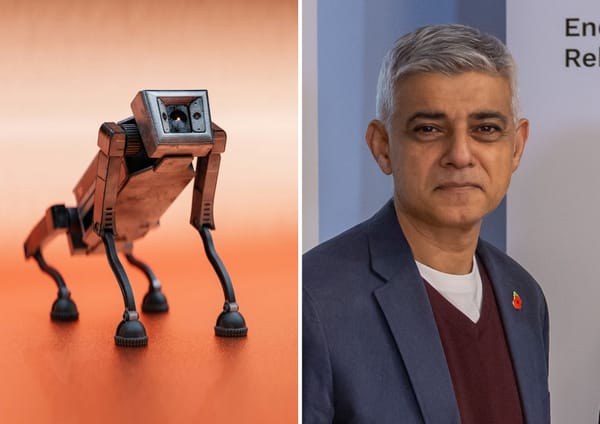British justice engages Microsoft's Copilot, prompts "legal Russian roulette" warnings
Crown Prosecution Service set to spend millions of pounds of taxpayers' money on GenAI, despite hallucination risks and human job loss fears.

The UK Crown Prosecution Service has committed to spending £8 million on rolling out Microsoft's Copilot, prompting questions about the risks and dangers of embedding Generative AI at the heart of British justice.
Earlier this week, the CPS trumpeted the results of a new AI study that found GenAI could save individual civil servants almost two weeks of work per year.
At the end of May, it made a much quieter announcement in a legally mandated document called a pipeline notice: confirming it was working with Microsoft to "change the game".
We're not about to see chatbots in the Old Bailey. Copilot is not going to take silk or get appointed to the High Court. Frankly, AI is nowhere near reliable enough to play a leading role in the justice system.
But AI is certainly set to become the ultimate bureaucrat, meaning humans working in roles requiring admin or routine work have good reason to fear the expansion of its use.
The CPS said AI will play an "important role" in improving productivity and cutting costs, promising to launch initiatives that will "benefit a large volume of colleagues".
Will AI replace human public sector employees?
The commitment to a large-scale rollout of Copilot does not spell immediate doom for the civil servant. But it's certainly a milestone in a longer journey in which we will see machines take up much of the busy work needed to run a state, raising questions about whether the public sector will need to employ anywhere near as many humans.
Cheney Hamilton, an analyst at Bloor Research Group, said the £8 million investment is a "bold, arguably premature move".
She told Machine: "At the heart of prosecution is the concept of fairness, privacy and due process and we need to ask: is a generative AI, trained on generalised data sets and prone to hallucinations, fit for that purpose?
"Are we introducing technology that helps the CPS draft safer, clearer documents? Or are we introducing automation into a justice system already strained by bias, underfunding and digital fragility?"
Hamilton, who is also founder and CEO of a flexible jobs firm called Find Your Flex, told us the biggest concern is data integrity.
Put simply: there can be no hallucinations when processing the data and information which enables the CPS to decide whether to bring criminal charges and prosecute cases in England and Wales. At this stage of its development, GenAI is infamous for making things up and may be an extremely unreliable witness when processing evidence and other critical documents.
However, if AI capabilities continue to accelerate exponentially, early teething problems are likely to be ironed out and new skills added. The result will be an automated bureaucracy in which machines perform a growing share of both simple and cognitively complex tasks.
"Will Copilot be used to supplement staff, or replace them?" Hamilton asked. "Will junior legal professionals lose out on critical experience as AI drafts become the norm? We risk hollowing out the future talent pipeline in the name of short-term productivity.
"I’m not anti-AI, quite the opposite, but we need robust governance frameworks, AI literacy in public sector leadership and a serious conversation about ethical usage. This tender could unlock huge potential or become a cautionary tale.
"The CPS should lead with transparency: who is evaluating risk? How is the public being safeguarded? And where is the human oversight? Without those answers, this isn’t digital transformation. It’s legal Russian roulette.”
How will the CPS use Microsoft Copilot?
In its contract notice, the CPS said it would deploy AI "proactively" to change the game" and "transform our processes and unlock wider system thinking".
"Copilot presents a significant opportunity in this regard," it wrote. "There is widespread recognition of the scale of opportunity, and that with people as our key investment and asset, AI has an important role to help us improve productivity."
The government praised Copilot's ability to "streamline tasks and enhance workplace efficiency" and said it would invest in "productivity initiatives that will benefit a large volume of colleagues" by helping them to work with Copilot.
In February 2025, the Attorney General revealed details of a pilot of Microsoft's assistant in response to a Parliamentary question, writing: "The Crown Prosecution Service (CPS) is exploring new and existing technologies, including AI, to enhance efficiency. AI has the potential to support the CPS day-to-day in the delivery of justice. I am keen to explore the opportunities for efficiency that this new technology can bring, being mindful of ethical considerations."
During August 2024, more than 400 staff across the CPS used Copilot to assist them in everyday tasks such as summarising emails, creating PowerPoint presentations, and analysing Excel data.
"The scheme established that Copilot reduced the amount of time it took staff to complete administrative and day-to-day tasks and has the capacity to save thousands of hours across the organisation," the Attorney General added.
Transforming Whitehall: AI at the heart of government
Earlier this week, the government released the results of a "landmark" GenAI trial involving 20,000 civil servants, claiming it saved each participant roughly two weeks of work each year.
It wrote: "That's the equivalent of giving 1,130 people a full year back - every year - to focus on higher-value tasks, innovation or public service impact, rather than admin-based work - with the potential for this to rise significantly if used across the entire civil service, transforming productivity and public service delivery at scale."
The trial specifically named Microsoft 365 Copilot as one of the models involved and said it was used to assist with everyday tasks such as drafting documents, summarising lengthy emails, updating records, and preparing reports – saving users an average of 26 minutes per day.
At Companies House, staff used Copilot to handle routine customer queries and speed up tasks like drafting responses and updating records. At the Department for Work and Pensions, work coaches used AI to personalise advice for jobseekers.
One DWP agent said: "Using Copilot, I was able to help a self-employed customer – Customer X – revitalise her small business. Together, we created tailored social media posts to boost her online presence and used AI to identify cost-saving opportunities.
"Within a week, she’d secured 7 new client bookings. She’s now using Copilot to streamline admin and manage bookings – freeing up time to grow her business. It’s a powerful example of how AI can deliver real results for the people we support."
The government's AI transformation is part of a wider bid to modernise the state and make £45 billion of savings to make "public services faster, simpler, and more accessible". This means rolling out digital tools like the GOV.UK App, Chat and, yes, tackling "outdated legacy systems that currently cost billions in lost productivity".
Speaking at SXSW London, Technology Secretary Peter Kyle said: "These findings show that AI isn’t just a future promise – it’s a present reality. Whether it’s helping draft documents, preparing lesson plans, or cutting down on routine admin, AI tools are saving civil servants time every day. That means we can focus more on delivering faster, more personalised support where it really counts.
Issuing a comment as part of the same announcement, Darren Hardman, CEO of Microsoft UK, said: "AI is the most transformative technology of our time and we’re already seeing its potential to reshape public service delivery. Whether that’s DWP work coaches helping more jobseekers into work, local authorities improving social care for the most vulnerable in society or NHS clinicians with more time to see patients, the potential is profound.
"As a strategic technology partner to the UK government, we have an amazing opportunity to help improve both the quality of the services people receive and the way they access them. This could unlock new levels of growth, efficiency, and innovation for the country.
"The government’s Microsoft 365 Copilot experiment shows what’s possible when people are empowered with the right tools: 26 mins per day (almost 2 weeks per year) less time on admin, more time delivering what matters. And the really exciting part is, this is just the beginning."
Do you have a story or insights to share? Get in touch and let us know.




